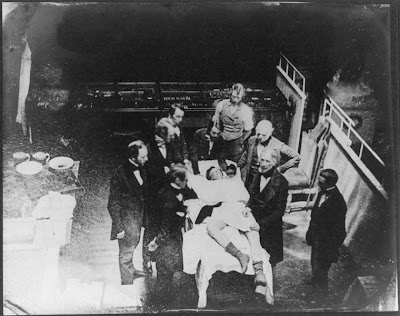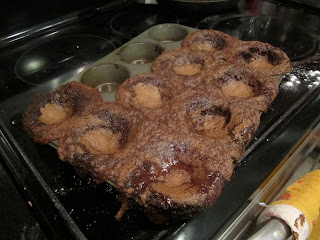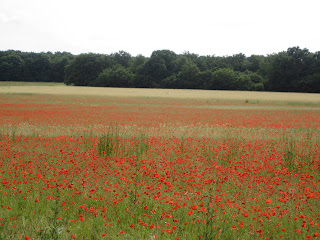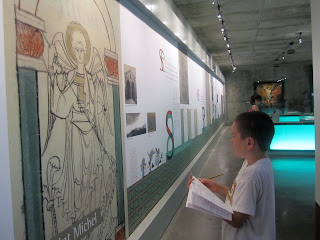
Yesterday I was in full-out
St. Martha mode trying to cater my husband's pontoon boat sunset cruise.
"What's a pontoon boat?" I had to ask him.
I saw a picture and decided it was a rectangular ring of benches on a floating platform covered by a canopy. I had to figure out what kind of food would be satisfying enough for the "light supper" his invitation mentioned but portable enough to eat on such a vessel.
"Finger foods," said a CRNA at work.
"Sandwiches," said another. "And watermelon slices."
My final menu consisted of the following (which, I realize, aren't at all coordinated with one another as a menu, but everything got eaten, so I guess no one minded):
Cherub tomatoes and carrot sticks with buttermilk ranch dip
Organic corn chips with chunky guacamole
Cucumber tea sandwiches with butter and dill
Cocktail meatballs with a sweet grape-jelly-and-chili-garlic sauce
Mediterranean pasta salad
Fresh strawberries and watermelon slices
I was busy. I mean, running around, organizing, shopping, slicing, cooking, trying-to-make-everything-look-and-taste-good busy. Work has been like this too recently - difficult airways, busy obstetric service, M&M (not the chocolate kind), running, running, running. It's definitely been a very "Martha" couple of weeks.
The "
Martha" I keep mentioning was a woman who, according to the Gospel of Luke, welcomed Jesus into her home, which she shared with her sister Mary and her brother Lazarus. The story goes like this (Luke 10:38-42):
As Jesus and his disciples were on their way, he came to a village where a woman named Martha opened her home to him. She had a sister called Mary, who sat at the Lord's feet listening to what he said. But Martha was distracted by all the preparations that had to be made. She came to him and asked, "Lord, don't you care that my sister has left me to do the work by myself? Tell her to help me!"
"Martha, Martha," the Lord answered, "you are worried and upset about many things, but only one thing is needed. Mary has chosen what is better, and it will not be taken away from her."
Does anyone find this just a little annoying? Does anyone else think the Son of the Most High could have used a little Sensitivity Training here?! You think turning water to wine was hard? Let's see you try to put a nice spread out for people you care about, at short notice, with no miracle-making powers, when you also care about food quality and presentation, etc.!
I jest, but there's truth in the spirit of what I'm saying. For the Marthas of the world, this New Testament story irritates. We work hard because we care about our welcome, we Marthas. We worry about the details because how you approach even the smallest thing is how you approach everything. All our fussing and fretting comes from a place of love. It's so unfair. Not only did Jesus fail to appreciate Martha's efforts and admonish Mary to help out a little more but he also actually praised the seemingly neglectful sister instead. What gives?
I can understand the need to emphasize contemplation and an interior life in the midst of day-to-day busy-ness, especially nowadays. People can't seem to slow down and just think, or watch sunsets, or listen to the hum of cicadas. A life of action without reflection can quickly drain the spirit, while a contemplative life without some kind of action remains hollow and unrealized. I get that. And I also understand putting priorities in perspective: it makes no sense to have every doily perfectly placed if one has missed out on a wonderful teaching moment or spiritual experience. I get that too. But work done out of love - not out of pride - is such a treasure in itself; couldn't Jesus have given Martha a little credit?
We had our share of "Mary" moments on the sunset cruise out of Cape Ann Marina in Gloucester. The weather was perfect, the water smooth, and the company warm and friendly. My husband put his arm around me as we looked out over the water and breathed in the sea air. Quiet moments nourish and refresh and can sometimes open up the world in new ways - there's no question about that. But as the feast of St. Martha approaches (July 29), I had to give a shout-out to her and all the Marthas of the world, whose nourishment, generously provided, makes a difference.











.jpg)











































